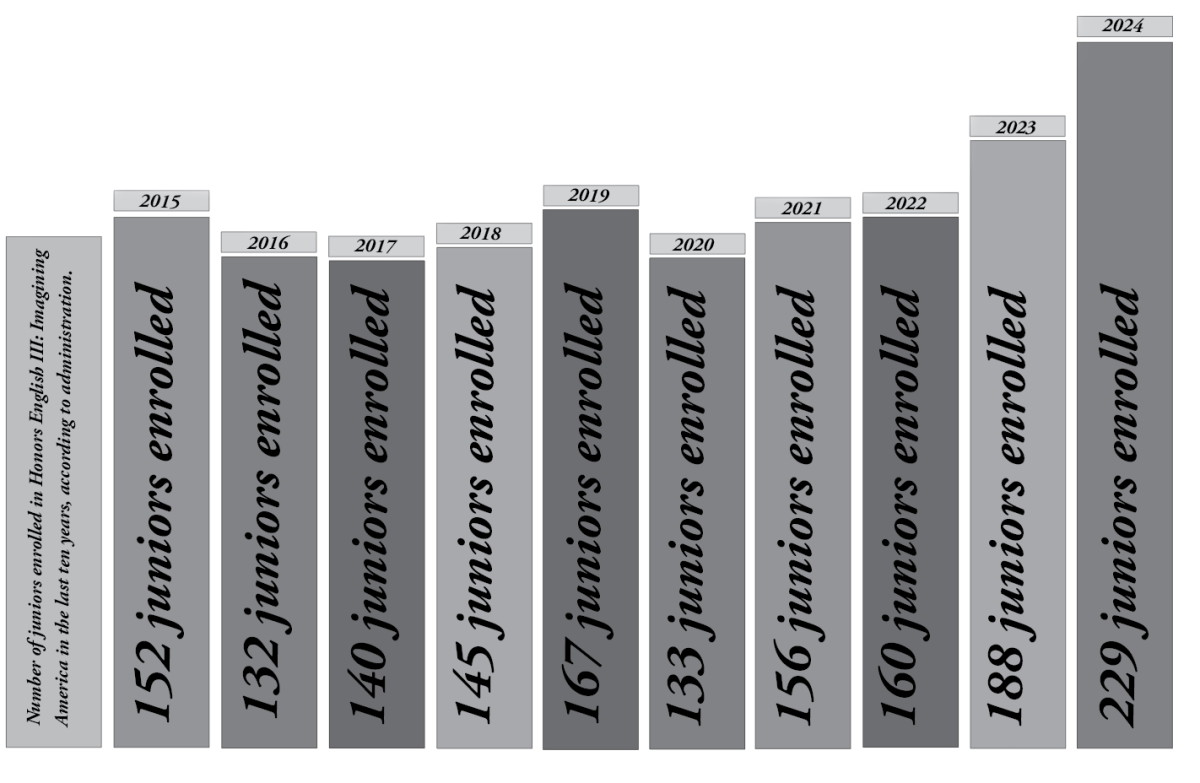A record number of juniors are enrolled in Honors English III: Imagining America this school year. However, there have been a higher amount of students that have struggled in the course, according to the English Department. Starting in the 2022-2023 school year, the school enacted a policy to remove the grade requirement to enter Honors English III and Honors U.S. History.
The enrollment in Honors English III has continuously increased each year since the policy was enacted. Following the removal of the grade requirement in the 2022-2023 school year, the percentage of incoming juniors in Honors English III has increased from 55% in 2022-2023 to 75% this year, according to Upper School Dean Sharon Cuseo. As a result, the sections of non-honors English have decreased to half the amount it was before, decreasing from 10 sections to five after the grade requirement was removed.
Cuseo said the removal of grade requirements for honors classes affords students greater access to courses that interest them.
“The policy definitely gives people a chance to try out honors courses,” Cuseo said. “There aren’t many opportunities to do that outside of English and history. Given that people feel limited because of the [Advanced Placement] AP and honors maximums, the policy allows for a balance to allow more opportunities for students that otherwise aren’t able to access [those classes].”
Cuseo said the increase in Honors English III sign-ups is due to a possible misunderstanding among students of the rigorous expectations of the course.
“People wanted to give [the class] a shot,” Cuseo said. “There may have been an erroneous sense of how hard the honors course would be, particularly in Honors English III. It’s actually a lot harder than one may expect and students are discovering that.”
English Department Head Larry Weber said a reason for students’ struggles in the course is due to a false sense of their ability to do well in Honors English III.
“There is a ‘for better or worse’ caveat to opting into Honors English III,” Weber said. “We had a large increase in enrollment this year into Honors English III over the last year, and some students have discovered that maybe they didn’t make the best choice for themselves as they’ve really struggled this fall.”
Head of Upper School Beth Slattery said a student’s mediocre performance in sophomore English may have led to poor grades in Honors English III.
“I don’t think that teachers are intentionally trying to weed people out,” Slattery said. “Now that there are more classes, particularly in junior year with English and history, where there no longer is a grade requirement. Teachers are just saying, if someone didn’t do particularly well in the preceding class, they might not get as good a grade. They’re just grading kids honestly, so it’s not really realistic for somebody to expect that if they performed modestly in sophomore English and then took Honors English III as a junior, their grade would go up.”
Weber said the unpredictability of when a student will improve their writing skills in English is an important reason for open enrollment into Honors English III.
“We think it’s more sound and fair for students to choose among clearly delineated options than for us to separate them into categories that can become a little imprecise on the margins,” Weber said. “Since growth as a reader and writer isn’t perfectly predictable, it’s tough to name the best timing for someone to take on more of a challenge.”
Slattery said even with the increase in signups for the course this school year, the amount of people that dropped was normal compared to past school years.
“The attrition out of [Honors English III] didn’t seem huge,” Slattery said. “There’s always a handful, but it didn’t feel particularly anomalous.”
English Teacher Stephanie Chiang teaches both English II and Honors English III. Chiang said she understands how the transition between the two classes causes stress among students, and believes a big part of that stress comes from the limiting timed assessments of the honors course.
“Timed anything can be very stressful,” Chiang said. “In Honors English III, every single unit has a timed aspect to the assessment. The last assessment of the English II class was personal writing and that felt very different from the other timed analytical writing where students are restrained to a specific passage or a poem. These assessments feel limiting in terms of time restraints and that can create a lot of anxiety for the students.”
Raya Soper ’26, who is also in Honors English III, said her confidence in her English skills has been weakened by the higher expectations held by the Honors English III teachers.
“I received high grades in my English class last year, so it took me by surprise when I received a lower grade than I expected in Honors English,” Soper said. “When I first got my grade back it definitely upset me, but I now understand the high expectations of Honors English and will hopefully improve on the next essay.”
Even with the increased enrollment into Honors English III, the other open enrollment course, Honors U.S. History, did not experience the same inflation of students in enrollment. Cuseo said the consistent enrollment into Honors U.S. History is due to students having a stronger understanding of the difficulty of the class.
Chiang said another reason students may struggle in Honors English III is due to the increased difficulty of the texts that are read.
“The texts are a lot harder in Honors English III,” Chiang said. “That is a big part of the rigor of the course. The books feel a lot more dense in terms of the language and the class is more fast paced.”
Some students feel the expectations for Honors English III were not clear during the enrollment period for class signups. Christian Yue ’26, who is currently a student in Honors English III, said he was surprised by the rigor of the class.
“I had no idea what Honors English was going to be like,” Yue said. “I found it much harder in terms of the difficulty of grading as well as expectations compared to last year. Although I did well in English the prior year, the start of this year has been surprisingly more intense. The texts we read are much more complex, and the teachers don’t really provide many examples of themes and connections that can be made in the book.”
Honors English III student Ruby Jacobs ’26 said even though she considered dropping the course, she understands that she will grow as an English student by the end of the year and is willing to put in the work to become a better writer.
“This class has definitely been a big step up from English class last year,” Jacobs said. “Even though I considered dropping the course after I struggled in the fall, I eventually decided to stay in the class. This class has definitely caused me some stress. I really do want to improve my writing skills and I believe the high expectations of Honors English will truly help me improve by the end of the year. The feedback the teachers provide is invaluable, and the high expectations of the class supply me with the extra push I need to motivate me to improve.”






























